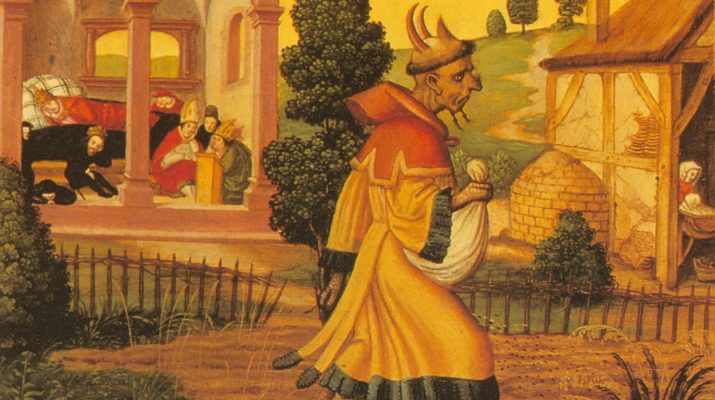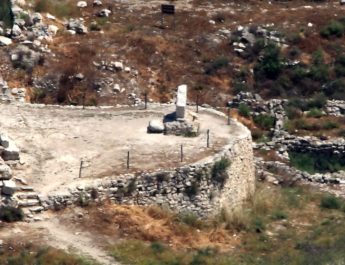Matthew 13:24-30, 36-43
Ordinary A34
24 He put beforeA them anotherB parable:C
A “put before” = paratithemi. 19x in NT. From para (by, beside, in the presence of) + tithemi (to put, place, set, fix, establish in a literal or figurative sense; properly, this is placing something in a passive or horizontal position). This is properly, to se beside or place before. So, it can mean to set or serve a meal, to deposit something with someone, to set forth an argument. It can also mean to entrust, commend, or tell a parable (as setting forth information).
B “another” = allos. This is other, another. Specifically, it is another of a similar kind or type. There is a different word in Greek that speaks of another as a different kind (heteros).
C “parable” = parabole. From paraballo (literally to throw beside, compare, arrive, liken); {from para (by, beside, in the presence of) + ballo (to throw, cast, place, put, drop)}. This is a parable, comparison, adage. Quite often a tale told or a metaphor to establish a point, but it could be a true story.
“The kingdomD of heavenE may be compared to someoneF who sowedG goodH seedI in his field;J
D “kingdom” = basileia. From basileus (king, emperor, sovereign); probably from basis (step, hence foot; a pace); from baino (to walk, to go). This is kingdom, rule, authority, sovereignty, royalty, a realm.
E “heaven” = ouranos. May be related to oros (mountain, hill) with the notion of height. This is the air, the sky, the atmosphere, and heaven. It is the sky that is visible and the spiritual heaven where God dwells. Heaven implies happiness, power, and eternity.
F “someone” = anthropos. Probably from aner (man, male, husband) + ops (eye, face). This is human, humankind. Used for all genders.
G “sowed” = speiro. Probably from spao (to pull or draw like one draws a sword). This is sowing a seed or scattering. It is sowing in a literal or figurative sense.
H “good” = kalos. This is good, noble, beautiful, correct, or worthy. This is external signs of goodness like beauty, demonstrations of honorable character, showing moral virtues. A different word, agathos, speaks of intrinsic good.
I “seed” = sperma. Related to “sowed” in v24. From speiro (see note G above). This is something sown so it could be seed or offspring and descendants. This is where the word “sperm” comes from.
J “field” = agro. This is a field, whether one planted with crops or on which one pastures cattle. It can also be a piece of land, the country, an estate. This is where “agriculture” comes from.
25 but while everybody was asleep, an enemyK came and sowed weedsL among the wheat,M and then went away.
K “enemy came” = ho + anthropos + erchomai + autos + ho + echthros. Literally “the person came – his enemy.” Anthropos is the same as “someone” in v24. See note F above. Echthros is from echthos (hatred). This is an openly hostile person so an enemy, a foe, or a hated person. This speaks of irreconcilable hostility. It can also mean adversary and/or refer to Satan.
L “weeds” = zizanion. 8x in NT. Perhaps originally a Sumerian word. This is zizanium – a plant that looks like wheat, but is worthless. It is also translated as a tare or darnel. Figuratively, this is a false believer or someone who lives apart from faith.
M “wheat” = sitos. 15x in NT. This is used for any kind of grain that you can eat. It is usually wheat, but it can also be barley and other grains.
26 So when the plantsN came upO and bore grain,P then the weeds appearedQ as well.
N “plants” = chortos. 15x in NT. This is food, grass, hay, wheat. It can also be a place of feeding, garden, court, or pasture.
O “came up” = blastano. 4x in NT. Perhaps from blastos (a sprout). This is to sprout, germinate, bud, or bring forth. It can also imply yielding fruit. This also shares a root with the word “blastocyte.”
P “grain” = karpos. Perhaps from harpazo (to seize by force, snatch away); from haireo (to choose, take). This is a fruit or vegetable, through sometimes it refers to an animal. Figuratively, it is deeds, results, profits, or gain.
Q “appeared” = phaino. This is to bring light, cause to appear, shine, become visible or clear. This is show in a literal or figurative sense.
27 And the slavesR of the householderS came and said to him, ‘Master,T did you not sow good seed in your field? Where, then, did these weeds come from?’
R “slaves” = doulos. Perhaps from deo (to tie, bind, fasten, impel, compel; to declare something against the law or prohibited). This is used for a servant or for a slave, enslaved. It refers to someone who belongs to someone else. But, it could be voluntary (choosing to be enslaved to pay off debt) or involuntary (captured in war and enslaved). It is used as a metaphor for serving Christ. Slavery was not inherited (i.e. the children of slaves were not assumed to be slaves) and slaves could buy their way to freedom. Slavery was generally on a contractual basis (that is for the duration of how long it took you to pay your debt and/or save up enough money to buy your freedom).
S “householder” = oikodespotes. 12x in NT. From oikos (house – the building, the household, the family, descendants; the temple) + despotes (lord, master, despot; authority who has unrestricted power and jurisdiction) + posis (husband). This is the master of the house, head of a family, or the householder.
T “master” = kurios. From kuros (authority, supremacy). This is a respectful address meaning master or sir. It refers to one who has control or power greater than one’s own. So, it was also applied to God and Jesus as Master or Lord.
28 He answered,U ‘An enemyV has done this.’
The slaves said to him, ‘Then do you wantW us to go and gatherX them?’
U “answered” = phemi. From phao (to shine). This is to declare, say, or use contrasts in speaking to shed light on one point of view.
V “enemy” = autos + echthros + anthropos + houtos. Literally “his enemy, this man.” Anthropos is the same as “someone” in v24. See note F above. Echthros is the same as “enemy” in v25. See note K above
W “want” = thelo. This is to wish, desire, will, or intend. It is to choose or prefer in a literal or figurative sense. It can also mean inclined toward or take delight in. It can have a sense of being ready to act on the impulse in question.
X “gather” = sullego. 8x in NT. From sun (with, together with) + lego (to speak, tell, mention). This is to gather up or gather together.
29 But he replied, ‘No; for in gathering the weeds you would uprootY the wheat along with them. 30 LetZ both of them grow together until the harvest;AA and at harvest timeBB I will tell the reapers,CC
Y “uproot” = ekrizoo. 4x in NT. From ek (from, from out of) + rhizoo (to take root, plant, establish, become stable); {from rhiza (a root literally or figuratively so it would be the root of what comes from it – shoot, source, descendant)}. This is to pull up by the roots, uproot.
Z “let” = aphiemi. From apo (from, away from) + hiemi (to send). This is send away, release, permit, forgive, allow to depart, discharge, or send forth.
AA “harvest” = therismos. 13x in NT. From therizo (to reap, gather, harvest); from theros (summer; the heat, which implies summer); from thero (to heat). This is harvesting or reaping. By implication, it is the crop that was harvested.
BB “time” = kairos. This is season, opportunity, occasion. The word chronos is used for chronological time. Kairos is used for spiritually significant time – the right time or appointed time.
CC “reapers” = theristes. Related to “harvest” in v30. 2x in NT. From therizo (see note AA above).
CollectDD the weeds first and bindEE them in bundlesFF to be burned, but gatherGG the wheat into my barn.’”HH
DD “collect” = sullego. Same as “gather” in v28. See note X above.
EE “bind” = deo. Related to “slaves” in v27. See note R above.
FF “bundles” = desme. Related to “slaves” in v & “bind” in v30. 1x in NT. From desmeo (bind, tie, shackle, confine); from desmeuo (to put in chains, captor, tie up a burden); from desmos (chain, bond, imprisonment, infirmity); from deo (see note R above). This is bundle.
GG “gather” = sunago. From sun (with, together with, closely associated) + ago (to lead, bring, carry, guide, go, drive). This is to lead together and so to assemble, bring together, welcome with hospitality, or entertain. In the sense of assembly, this is the root of the word “synagogue.”
HH “barn” = apotheke. Related to “put before” in v24. 6x in NT. From apotithemi (to lay aside, put off, put away, cast off, lay down); {from apo (from, away from) + tithemi (see note A above)}. This is a storehouse, granary, or barn. More broadly speaking, it is a place where one lays something aside – a repository.
36 Then he leftII the crowds and went into the house.JJ And his disciplesKK approached him, saying, “ExplainLL to us the parable of the weeds of the field.”
II “left” = aphiemi. Same as “let” in v30. See note Z above.
JJ “house” = oikia. Related to “householder” in v27. From oikos (see note S above). This is a house, household, goods, property, family, or means.
KK “disciples” = mathetes. From matheteuo (to make a disciple of); from manthano (to learn key facts, gain knowledge from experience; generally implies reflection as part of the learning process); from math– (thinking things through). This is a disciple, learner, or student. It is where we get “mathematics” from.
LL “explain” = diasapheo. 2x in NT. From dia (through, across to the other side, thoroughly) + saphes (clear). This is to make clear – to report, tell, or declare.
37 He answered, “The one who sows the good seed is the Son of Man;MM 38 the field is the world,NN and the good seed are the childrenOO of the kingdom; the weeds are the children of the evilPP one,
MM “man” = anthropos. Same as “someone” in v24. See note F above.
NN “world” = kosmos. Perhaps from the base of komizo (to carry, convey, recover); from komeo (to take care of). This is order, the world, the universe, including its inhabitants. Literally, this is something that is ordered so it can refer to all creation. It can also refer to decoration in the sense that something is better ordered and, thus, made more beautiful. This is where “cosmos” and “cosmetics” come from.
OO “children” = huios. Literally “sons.”
PP “evil” = poneros. From poneo (to toil); related to ponos (pain, trouble, labor, distress, suffering; toil, which implies anguish); from the base of penes (a laborer, poor person, starving or indigent person; someone who works for their living); from pernomai (working for a living; laborer, poor person; to work for daily bread); from peno (to toil to survive day by day). This is bad, evil, wicked, malicious, grievous, or toilsome. Properly, it is something that bears pain – it emphasizes the miseries and pains that come with evil. By contrast, the Greek kakos refers to evil as part of someone’s core character. Also contrasting the Greek sapros, which deals with falling away from a previously embodied virtue. This word can mean ill, diseased, morally culpable, derelict, vicious, malicious, or guilt. It can also refer to the devil or sinners.
39 and the enemy who sowed them is the devil;QQ the harvest is the endRR of the age,SS and the reapers are angels.TT 40 Just as the weeds are collected and burned up with fire, so will it be at the end of the age.
QQ “devil” = diabolos. Related to “parable” in v24. From diaballo (laying a charge against someone, generally with hostility; literally, to thrust through or cast back and forth– used for slandering, accusing, or gossiping; whether or not the sentiment is true, it is spread with negative intention); {from dia (through, across, because of, thoroughly) + ballo (see note C above)}. This is a properly a slanderer or someone who accuses falsely – criticizing unfairly with the intent to cause harm or damage character. This can also mean backbiter or malicious gossip. Also, the Slanderer, the Devil.
RR “end” = sunteleia. 6x in NT. From sunteleo (to fulfill, accomplish, complete, bring to the desired result, to complete a goal literally or figuratively); {from sun (with, together with) + teleo (to complete, fulfill, accomplish, end); from telos (an end, aim, purpose, completion, end goal, consummation, tax; going through the steps to complete a stage or phase and then moving on to the next one)}}. This is completion, end, consummation – joint action or joint payment.
SS “age” = aion. From the same as aei (ever, always, unceasingly, perpetually; on every occasion). This is an age, cycle of time, course, continued duration. It is also used to describe the eternal or forever. This is the word used to discuss the present age or the messianic age.
TT “angels” = aggelos. Perhaps related to “gather” in v30. Perhaps from ago (see note GG above) + agele (flock, herd, drove) [also from ago (see above)]. This is angel or messenger. Properly, it is one sent with news or to perform a specific task. This messenger can be human or an angel from heaven. More commonly, it is used for angels in the New Testament.
41 The Son of Man will sendUU his angels, and they will collect out of his kingdom all causes of sinVV and all evildoers,WW
UU “send” = apostello. From apo (from, away from) + stello (to send, set, arrange, prepare, gather up); {probably from histemi (to make to stand, stand, place, set up, establish, appoint, stand firm, be steadfast)}. This is to send forth, send away, dismiss, send as a messenger. It implies one that is sent for a particular mission or purpose rather than a quick errand. This is where “apostle” comes from.
VV “causes of sin” = skandalon. 15x in NT. Perhaps from kampto (to bend or bow). This is a stumbling block, offense, hindrance, or scandal. Properly, this is the part of the trap that triggers it shut on the victim. So, as a snare, it is anything that causes error or offense, something that makes one stumble or traps someone. This is where the word “scandal” comes from.
WW “evildoers” = poieo + ho + anomia. Literally “doers of lawlessness.” Anomia is 15x in NT. From anomos (literally without law; could refer to someone who disregards authority or one who is not under the law (i.e. a Gentile); lawless, wicked, or a transgressor); {from a (not, without) + nomos (what is assigned – usage, law, custom, principle; used for the law in general or of God’s law; sometimes used to refer to the first five books of the Bible or the entire Old Testament; also used to refer to theology or the practice and tradition of interpreting and implementing the law of God); {from nemo (to parcel out, assign)}}. This is lawlessness, disobedience, without law, violation. It is disregarding the law whether human or God’s law, including the harmful impact.
42 and they will throwXX them into the furnace of fire, where there will be weepingYY and gnashingZZ of teeth. 43 Then the righteousAAA will shine like the sun in the kingdom of their Father. Let anyone with ears listen!BBB
XX “throw” = ballo. Related to “parable” in v24 & “devil” in v39. See note C above.
YY “weeping” = klauthmos. 9x in NT. From klaio (to weep, lament, or sob; weeping aloud). This is weeping, lamentation, shrieks, intense pain.
ZZ “gnashing” = brugmos. 7x in NT. From brucho (to bite, grind, grate teeth – in rage or pain). This is biting, grinding, grating teeth.
AAA “righteous” = dikaios. From dike (the principle of justice; that which is right in a way that is very clear; a decision or the execution of that decision; originally, this word was for custom or usage; evolved to include the process of law, judicial hearing, execution of sentence, penalty, and even vengeance; more commonly, it refers to what is right); may be from deiknumi (to show, point out, exhibit; figurative for teach, demonstrate, make known). This is correct, righteous, just, or a righteous person. It implies innocent or conforming to God’s standard of justice.
BBB “listen” = akouo. This is hear or listen, but it also means to understand by hearing. This is where the word “acoustics” comes from.
Image Credit: “The Parable of the Evil Enemy” from the Mömpelgard Altar by Heinrich Füllmaurer, circa 1540.




